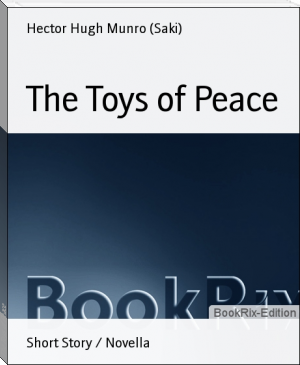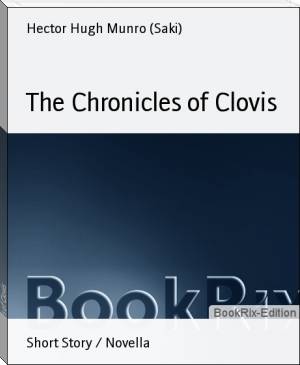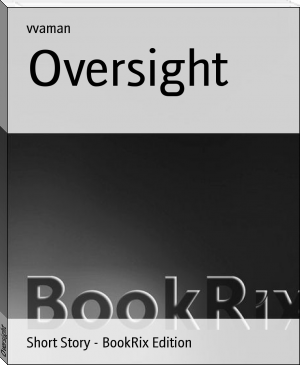The Toys of Peace - Hector Hugh Munro (Saki) (best ereader manga .txt) 📗

- Author: Hector Hugh Munro (Saki)
Book online «The Toys of Peace - Hector Hugh Munro (Saki) (best ereader manga .txt) 📗». Author Hector Hugh Munro (Saki)
hear the news," said the Prime Minister hopefully; "hark! They are booing some one now! That must be McKenna."
The Home Secretary entered the room a moment later, disaster written on his face.
"He won't go!" he exclaimed.
"Won't go? Won't leave gaol?"
"He won't go unless he has a brass band. He says he never has left prison without a brass band to play him out, and he's not going to go without one now."
"But surely that sort of thing is provided by his supporters and admirers?" said the Prime Minister; "we can hardly be supposed to supply a released prisoner with a brass band. How on earth could we defend it on the Estimates?"
"His supporters say it is up to us to provide the music," said the Home Secretary; "they say we put him in prison, and it's our affair to see that he leaves it in a respectable manner. Anyway, he won't go unless he has a band."
The telephone squealed shrilly; it was a trunk call from Nemesis.
"Poll opens in five minutes. Is Platterbaff out yet? In Heaven's name, why--"
The Chief Organiser rang off.
"This is not a moment for standing on dignity," he observed bluntly; "musicians must be supplied at once. Platterbaff must have his band."
"Where are you going to find the musicians?" asked the Home Secretary wearily; "we can't employ a military band, in fact, I don't think he'd have one if we offered it, and there ain't any others. There's a musicians' strike on, I suppose you know."
"Can't you get a strike permit?" asked the Organiser.
"I'll try," said the Home Secretary, and went to the telephone.
Eight o'clock struck. The crowd outside chanted with an increasing volume of sound:
"Will vote the other way."
A telegram was brought in. It was from the central committee rooms at Nemesis. "Losing twenty votes per minute," was its brief message.
Ten o'clock struck. The Prime Minister, the Home Secretary, the Chief Organiser, and several earnest helpful friends were gathered in the inner gateway of the prison, talking volubly to Demosthenes Platterbaff, who stood with folded arms and squarely planted feet, silent in their midst. Golden-tongued legislators whose eloquence had swayed the Marconi Inquiry Committee, or at any rate the greater part of it, expended their arts of oratory in vain on this stubborn unyielding man. Without a band he would not go; and they had no band.
A quarter past ten, half-past. A constant stream of telegraph boys poured in through the prison gates.
"Yamley's factory hands just voted you can guess how," ran a despairing message, and the others were all of the same tenour. Nemesis was going the way of Reading.
"Have you any band instruments of an easy nature to play?" demanded the Chief Organiser of the Prison Governor; "drums, cymbals, those sort of things?"
"The warders have a private band of their own," said the Governor, "but of course I couldn't allow the men themselves--"
"Lend us the instruments," said the Chief Organiser.
One of the earnest helpful friends was a skilled performer on the cornet, the Cabinet Ministers were able to clash cymbals more or less in tune, and the Chief Organiser has some knowledge of the drum.
"What tune would you prefer?" he asked Platterbaff.
"The popular song of the moment," replied the Agitator after a moment's reflection.
It was a tune they had all heard hundreds of times, so there was no difficulty in turning out a passable imitation of it. To the improvised strains of "I didn't want to do it" the prisoner strode forth to freedom. The word of the song had reference, it was understood, to the incarcerating Government and not to the destroyer of the Albert Hall.
The seat was lost, after all, by a narrow majority. The local Trade Unionists took offence at the fact of Cabinet Ministers having personally acted as strike-breakers, and even the release of Platterbaff failed to pacify them.
The seat was lost, but Ministers had scored a moral victory. They had shown that they knew when and how to yield.
THE THREAT
Sir Lulworth Quayne sat in the lounge of his favourite restaurant, the Gallus Bankiva, discussing the weaknesses of the world with his nephew, who had lately returned from a much-enlivened exile in the wilds of Mexico. It was that blessed season of the year when the asparagus and the plover's egg are abroad in the land, and the oyster has not yet withdrawn into it's summer entrenchments, and Sir Lulworth and his nephew were in that enlightened after-dinner mood when politics are seen in their right perspective, even the politics of Mexico.
"Most of the revolutions that take place in this country nowadays," said Sir Lulworth, "are the product of moments of legislative panic. Take, for instance, one of the most dramatic reforms that has been carried through Parliament in the lifetime of this generation. It happened shortly after the coal strike, of unblessed memory. To you, who have been plunged up to the neck in events of a more tangled and tumbled description, the things I am going to tell you of may seem of secondary interest, but after all we had to live in the midst of them."
Sir Lulworth interrupted himself for a moment to say a few kind words to the liqueur brandy he had just tasted, and them resumed his narrative.
"Whether one sympathises with the agitation for female suffrage or not one has to admit that its promoters showed tireless energy and considerable enterprise in devising and putting into action new methods for accomplishing their ends. As a rule they were a nuisance and a weariness to the flesh, but there were times when they verged on the picturesque. There was the famous occasion when they enlivened and diversified the customary pageantry of the Royal progress to open Parliament by letting loose thousands of parrots, which had been carefully trained to scream 'Votes for women,' and which circled round his Majesty's coach in a clamorous cloud of green, and grey and scarlet. It was really rather a striking episode from the spectacular point of view; unfortunately, however, for its devisers, the secret of their intentions had not been well kept, and their opponents let loose at the same moment a rival swarm of parrots, which screeched 'I don't think' and other hostile cries, thereby robbing the demonstration of the unanimity which alone could have made it politically impressive. In the process of recapture the birds learned a quantity of additional language which unfitted them for further service in the Suffragette cause; some of the green ones were secured by ardent Home Rule propagandists and trained to disturb the serenity of Orange meetings by pessimistic reflections on Sir Edward Carson's destination in the life to come. In fact, the bird in politics is a factor that seems to have come to stay; quite recently, at a political gathering held in a dimly-lighted place of worship, the congregation gave a respectful hearing for nearly ten minutes to a jackdaw from Wapping, under the impression that they were listening to the Chancellor of the Exchequer, who was late in arriving."
"But the Suffragettes," interrupted the nephew; "what did they do next?"
"After the bird fiasco," said Sir Lulworth, "the militant section made a demonstration of a more aggressive nature; they assembled in force on the opening day of the Royal Academy Exhibition and destroyed some three or four hundred of the pictures. This proved an even worse failure than the parrot business; every one agreed that there was always far too many pictures in the Academy Exhibition, and the drastic weeding out of a few hundred canvases was regarded as a positive improvement. Moreover, from the artists' point of view it was realised that the outrage constituted a sort of compensation for those whose works were persistently 'skied', since out of sight meant also out of reach. Altogether it was one of the most successful and popular exhibitions that the Academy had held for many years. Then the fair agitators fell back on some of their earlier methods; they wrote sweetly argumentative plays to prove that they ought to have the vote, they smashed windows to show that they must have the vote, and they kicked Cabinet Ministers to demonstrate that they'd better have the vote, and still the coldly reasoned or unreasoned reply was that they'd better not. Their plight might have been summed up in a perversion of Gilbert's lines--
"Twenty voteless millions we,
Voteless all against our will,
Twenty years hence we shall be
Twenty voteless millions still."
And of course the great idea for their master-stroke of strategy came from a masculine source. Lena Dubarri, who was the captain-general of their thinking department, met Waldo Orpington in the Mall one afternoon, just at a time when the fortunes of the Cause were at their lowest ebb. Waldo Orpington is a frivolous little fool who chirrups at drawing-room concerts and can recognise bits from different composers without referring to the programme, but all the same he occasionally has ideas. He didn't care a twopenny fiddlestring about the Cause, but he rather enjoyed the idea of having his finger in the political pie. Also it is possible, though I should think highly improbable, that he admired Lena Dubarri. Anyhow, when Lena gave a rather gloomy account of the existing state of things in the Suffragette World, Waldo was not merely sympathetic but ready with a practical suggestion. Turning his gaze westward along the Mall, towards the setting sun and Buckingham Palace, he was silent for a moment, and then said significantly, 'You have expended your energies and enterprise on labours of destruction; why has it never occurred to you to attempt something far more terrific?'
"'What do you mean?' she asked him eagerly.
"'Create.'
"'Do you mean create disturbances? We've been doing nothing else for months,' she said.
"Waldo shook his head, and continued to look westward along the Mall. He's rather good at acting in an amateur sort of fashion. Lena followed his gaze, and then turned to him with a puzzled look of inquiry.
"'Exactly,' said Waldo, in answer to her look.
"'But--how can we create?' she asked; 'it's been done already.'
"'Do it again ,' said Waldo, 'and again and again--'
"Before he could finish the sentence she had kissed him. She declared afterwards that he was the first man she had ever kissed, and he declared that she was the first woman who had ever kissed him in the Mall, so they both secured a record of a kind.
"Within the next day or two a new departure was noticeable in Suffragette tactics. They gave up worrying Ministers and Parliament and took to worrying their own sympathisers and supporters--for funds. The ballot- box was temporarily forgotten in the cult of the collecting-box. The daughters of the horseleech were not more persistent in their demands, the financiers of the tottering ancien regime were not more desperate in their expedients for raising money than the Suffragist workers of all sections at this juncture, and in one way and another, by fair means and normal, they really got together a very useful sum. What they were
The Home Secretary entered the room a moment later, disaster written on his face.
"He won't go!" he exclaimed.
"Won't go? Won't leave gaol?"
"He won't go unless he has a brass band. He says he never has left prison without a brass band to play him out, and he's not going to go without one now."
"But surely that sort of thing is provided by his supporters and admirers?" said the Prime Minister; "we can hardly be supposed to supply a released prisoner with a brass band. How on earth could we defend it on the Estimates?"
"His supporters say it is up to us to provide the music," said the Home Secretary; "they say we put him in prison, and it's our affair to see that he leaves it in a respectable manner. Anyway, he won't go unless he has a band."
The telephone squealed shrilly; it was a trunk call from Nemesis.
"Poll opens in five minutes. Is Platterbaff out yet? In Heaven's name, why--"
The Chief Organiser rang off.
"This is not a moment for standing on dignity," he observed bluntly; "musicians must be supplied at once. Platterbaff must have his band."
"Where are you going to find the musicians?" asked the Home Secretary wearily; "we can't employ a military band, in fact, I don't think he'd have one if we offered it, and there ain't any others. There's a musicians' strike on, I suppose you know."
"Can't you get a strike permit?" asked the Organiser.
"I'll try," said the Home Secretary, and went to the telephone.
Eight o'clock struck. The crowd outside chanted with an increasing volume of sound:
"Will vote the other way."
A telegram was brought in. It was from the central committee rooms at Nemesis. "Losing twenty votes per minute," was its brief message.
Ten o'clock struck. The Prime Minister, the Home Secretary, the Chief Organiser, and several earnest helpful friends were gathered in the inner gateway of the prison, talking volubly to Demosthenes Platterbaff, who stood with folded arms and squarely planted feet, silent in their midst. Golden-tongued legislators whose eloquence had swayed the Marconi Inquiry Committee, or at any rate the greater part of it, expended their arts of oratory in vain on this stubborn unyielding man. Without a band he would not go; and they had no band.
A quarter past ten, half-past. A constant stream of telegraph boys poured in through the prison gates.
"Yamley's factory hands just voted you can guess how," ran a despairing message, and the others were all of the same tenour. Nemesis was going the way of Reading.
"Have you any band instruments of an easy nature to play?" demanded the Chief Organiser of the Prison Governor; "drums, cymbals, those sort of things?"
"The warders have a private band of their own," said the Governor, "but of course I couldn't allow the men themselves--"
"Lend us the instruments," said the Chief Organiser.
One of the earnest helpful friends was a skilled performer on the cornet, the Cabinet Ministers were able to clash cymbals more or less in tune, and the Chief Organiser has some knowledge of the drum.
"What tune would you prefer?" he asked Platterbaff.
"The popular song of the moment," replied the Agitator after a moment's reflection.
It was a tune they had all heard hundreds of times, so there was no difficulty in turning out a passable imitation of it. To the improvised strains of "I didn't want to do it" the prisoner strode forth to freedom. The word of the song had reference, it was understood, to the incarcerating Government and not to the destroyer of the Albert Hall.
The seat was lost, after all, by a narrow majority. The local Trade Unionists took offence at the fact of Cabinet Ministers having personally acted as strike-breakers, and even the release of Platterbaff failed to pacify them.
The seat was lost, but Ministers had scored a moral victory. They had shown that they knew when and how to yield.
THE THREAT
Sir Lulworth Quayne sat in the lounge of his favourite restaurant, the Gallus Bankiva, discussing the weaknesses of the world with his nephew, who had lately returned from a much-enlivened exile in the wilds of Mexico. It was that blessed season of the year when the asparagus and the plover's egg are abroad in the land, and the oyster has not yet withdrawn into it's summer entrenchments, and Sir Lulworth and his nephew were in that enlightened after-dinner mood when politics are seen in their right perspective, even the politics of Mexico.
"Most of the revolutions that take place in this country nowadays," said Sir Lulworth, "are the product of moments of legislative panic. Take, for instance, one of the most dramatic reforms that has been carried through Parliament in the lifetime of this generation. It happened shortly after the coal strike, of unblessed memory. To you, who have been plunged up to the neck in events of a more tangled and tumbled description, the things I am going to tell you of may seem of secondary interest, but after all we had to live in the midst of them."
Sir Lulworth interrupted himself for a moment to say a few kind words to the liqueur brandy he had just tasted, and them resumed his narrative.
"Whether one sympathises with the agitation for female suffrage or not one has to admit that its promoters showed tireless energy and considerable enterprise in devising and putting into action new methods for accomplishing their ends. As a rule they were a nuisance and a weariness to the flesh, but there were times when they verged on the picturesque. There was the famous occasion when they enlivened and diversified the customary pageantry of the Royal progress to open Parliament by letting loose thousands of parrots, which had been carefully trained to scream 'Votes for women,' and which circled round his Majesty's coach in a clamorous cloud of green, and grey and scarlet. It was really rather a striking episode from the spectacular point of view; unfortunately, however, for its devisers, the secret of their intentions had not been well kept, and their opponents let loose at the same moment a rival swarm of parrots, which screeched 'I don't think' and other hostile cries, thereby robbing the demonstration of the unanimity which alone could have made it politically impressive. In the process of recapture the birds learned a quantity of additional language which unfitted them for further service in the Suffragette cause; some of the green ones were secured by ardent Home Rule propagandists and trained to disturb the serenity of Orange meetings by pessimistic reflections on Sir Edward Carson's destination in the life to come. In fact, the bird in politics is a factor that seems to have come to stay; quite recently, at a political gathering held in a dimly-lighted place of worship, the congregation gave a respectful hearing for nearly ten minutes to a jackdaw from Wapping, under the impression that they were listening to the Chancellor of the Exchequer, who was late in arriving."
"But the Suffragettes," interrupted the nephew; "what did they do next?"
"After the bird fiasco," said Sir Lulworth, "the militant section made a demonstration of a more aggressive nature; they assembled in force on the opening day of the Royal Academy Exhibition and destroyed some three or four hundred of the pictures. This proved an even worse failure than the parrot business; every one agreed that there was always far too many pictures in the Academy Exhibition, and the drastic weeding out of a few hundred canvases was regarded as a positive improvement. Moreover, from the artists' point of view it was realised that the outrage constituted a sort of compensation for those whose works were persistently 'skied', since out of sight meant also out of reach. Altogether it was one of the most successful and popular exhibitions that the Academy had held for many years. Then the fair agitators fell back on some of their earlier methods; they wrote sweetly argumentative plays to prove that they ought to have the vote, they smashed windows to show that they must have the vote, and they kicked Cabinet Ministers to demonstrate that they'd better have the vote, and still the coldly reasoned or unreasoned reply was that they'd better not. Their plight might have been summed up in a perversion of Gilbert's lines--
"Twenty voteless millions we,
Voteless all against our will,
Twenty years hence we shall be
Twenty voteless millions still."
And of course the great idea for their master-stroke of strategy came from a masculine source. Lena Dubarri, who was the captain-general of their thinking department, met Waldo Orpington in the Mall one afternoon, just at a time when the fortunes of the Cause were at their lowest ebb. Waldo Orpington is a frivolous little fool who chirrups at drawing-room concerts and can recognise bits from different composers without referring to the programme, but all the same he occasionally has ideas. He didn't care a twopenny fiddlestring about the Cause, but he rather enjoyed the idea of having his finger in the political pie. Also it is possible, though I should think highly improbable, that he admired Lena Dubarri. Anyhow, when Lena gave a rather gloomy account of the existing state of things in the Suffragette World, Waldo was not merely sympathetic but ready with a practical suggestion. Turning his gaze westward along the Mall, towards the setting sun and Buckingham Palace, he was silent for a moment, and then said significantly, 'You have expended your energies and enterprise on labours of destruction; why has it never occurred to you to attempt something far more terrific?'
"'What do you mean?' she asked him eagerly.
"'Create.'
"'Do you mean create disturbances? We've been doing nothing else for months,' she said.
"Waldo shook his head, and continued to look westward along the Mall. He's rather good at acting in an amateur sort of fashion. Lena followed his gaze, and then turned to him with a puzzled look of inquiry.
"'Exactly,' said Waldo, in answer to her look.
"'But--how can we create?' she asked; 'it's been done already.'
"'Do it again ,' said Waldo, 'and again and again--'
"Before he could finish the sentence she had kissed him. She declared afterwards that he was the first man she had ever kissed, and he declared that she was the first woman who had ever kissed him in the Mall, so they both secured a record of a kind.
"Within the next day or two a new departure was noticeable in Suffragette tactics. They gave up worrying Ministers and Parliament and took to worrying their own sympathisers and supporters--for funds. The ballot- box was temporarily forgotten in the cult of the collecting-box. The daughters of the horseleech were not more persistent in their demands, the financiers of the tottering ancien regime were not more desperate in their expedients for raising money than the Suffragist workers of all sections at this juncture, and in one way and another, by fair means and normal, they really got together a very useful sum. What they were
Free e-book «The Toys of Peace - Hector Hugh Munro (Saki) (best ereader manga .txt) 📗» - read online now
Similar e-books:





Comments (0)